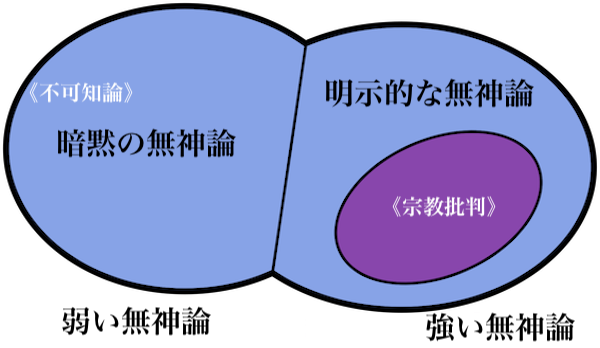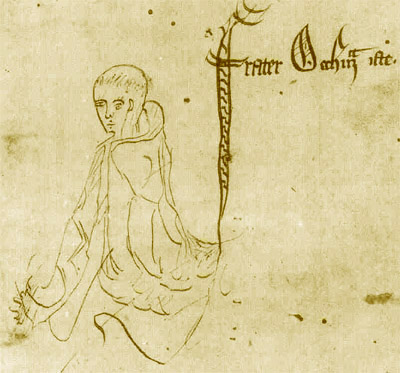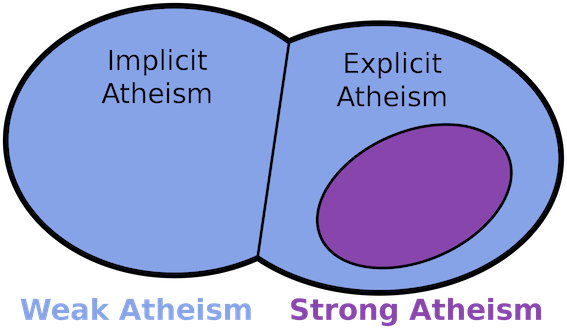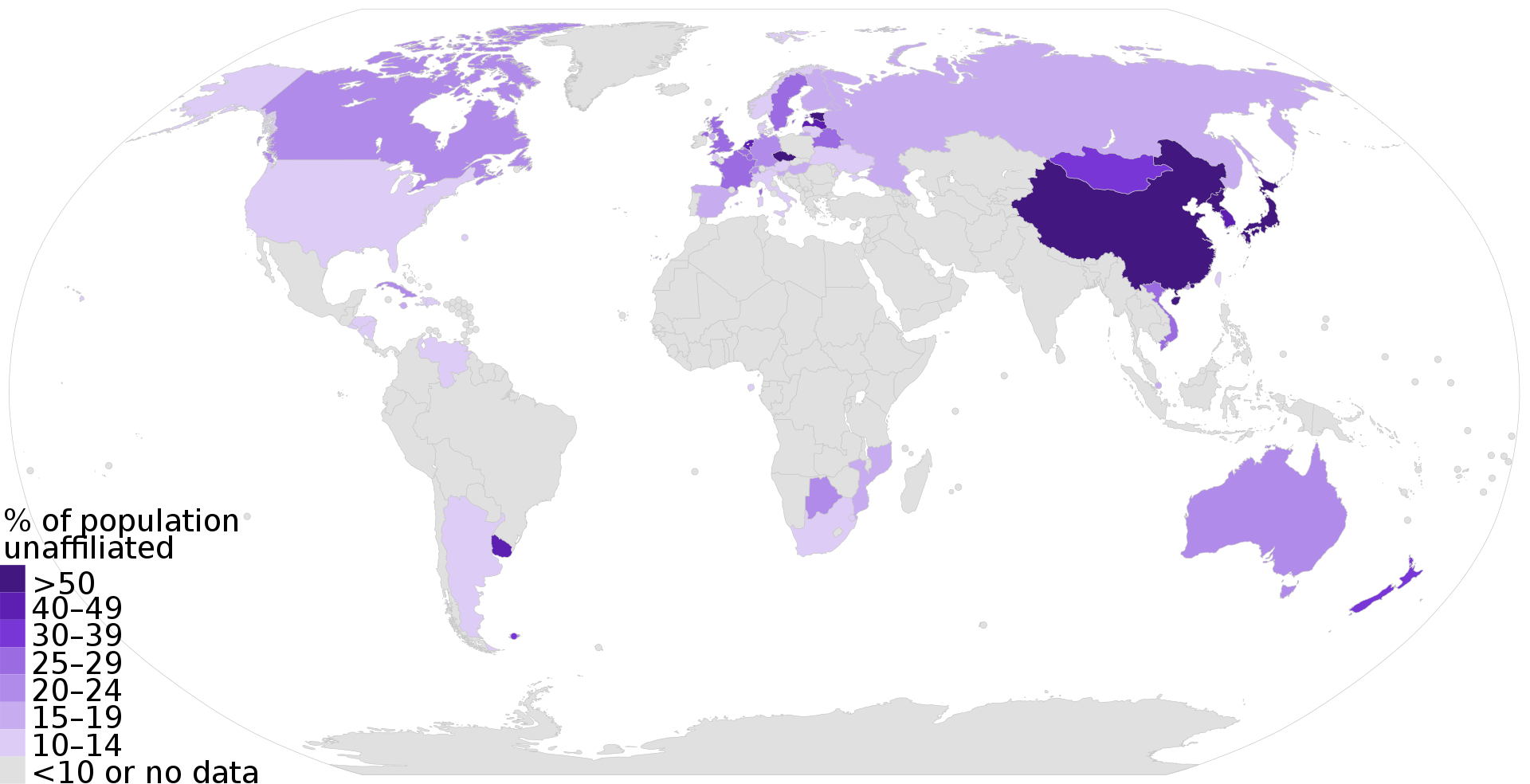無神論の系譜
Genealogy of atheism

無神論の系譜
Genealogy of atheism

解説:池田光穂
「彼の著書『実践理性批判』でカントが問題 にしたのは、魂が死にうることについての思索ではありませんでした。彼は非常に単純な疑問を投げか けているのです。私たちが倫理的行為体(エージェント)として能動的であるという事 実だけでそれが真実だと私たちが 前提にすべきものは何なのか、と。カント※の答えはまったく当然の帰結であり、異なるレヴェルでデリダ にさえ肯定されているのです。彼の答えは、少なくとも倫理に関する共通理解におい て、人びとは事 実上、魂の不滅と〈神〉の存在を前提としているというものです。これが哲学とは何かということであ り、「哲学者たる私は、宇宙にはなんらかの構造があると信じている云々」というのではなく、まさし く日常的な活動のなかで何が前提とされているのかを探究することなのです」(ジジェクとデイリー 2005:39)※「第二篇 純粋実践理性の弁証論(pdf_with_password)」 『実践理性批判』の最高善の議論と思われる(池田)。
神を否定する(=神は存在しない、神概念は仮構である、神は不在、神は死んだ、等々)ために 無神論=Atheismと呼ばれるが、それは宗教(religion)を信じないという意味で無宗教(Irreligion)を意味するのだと いう議論がある。無宗教は、以下のウィキペディアの引用文の"Irreligion"で説明している(→「不可知論者の系譜」)。
| "Atheism is in the broadest sense an absence of belief in the existence of deities.[1][2][3][4] Less broadly, atheism is a rejection of the belief that any deities exist.[5][6] In an even narrower sense, atheism is specifically the position that there are no deities.[1][2][7][8] Atheism is contrasted with theism,[9][10] which in its most general form is the belief that at least one deity exists.[10][11][12]" | 「無神論とは、広義には神々の存在を信じないことであり、より狭義に
は、いかなる神々も存在するという信念を否定することである。無神論は、最も一般的な形で、少なくとも一つの神が存在するという信念である神論と対比され
る」。 |
| "The etymological root for the word atheism originated before the 5th century BCE from the ancient Greek ἄθεος (atheos), meaning "without god(s)". In antiquity, it had multiple uses as a pejorative term applied to those thought to reject the gods worshiped by the larger society,[13] those who were forsaken by the gods, or those who had no commitment to belief in the gods.[14] The term denoted a social category created by orthodox religionists into which those who did not share their religious beliefs were placed.[14] The actual term atheism emerged first in the 16th century.[15] With the spread of freethought, skeptical inquiry, and subsequent increase in criticism of religion, application of the term narrowed in scope. The first individuals to identify themselves using the word atheist lived in the 18th century during the Age of Enlightenment.[16][15] The French Revolution, noted for its "unprecedented atheism", witnessed the first major political movement in history to advocate for the supremacy of human reason.[17]" | 「無神論の語源は紀元前5世紀以前、「神なし」を意味する古代ギリシャ
語ἄθεος(アテオス)に由来している。古代では、社会全体が崇拝する神々を否定すると考えられる人々、神々から見放された人々、あるいは神々を信じる
ことに何のこだわりも持たない人々を指す蔑称として複数の用法があった。この言葉は、正統派の宗教家が、自分たちと同じ宗教的信念を持たない人たちを社会
的なカテゴリーに分類したものである。実際の無神論という言葉は16世紀に初めて登場したが、自由思想の普及や懐疑的な探求、それに伴う宗教批判の高まり
によって、この言葉の適用範囲は狭まっていった。無神論者という言葉を最初に使ったのは、18世紀の啓蒙主義の時代である。フランス革命は「前例のない無
神論」で知られ、人間の理性の優位性を主張する歴史上初の大きな政治運動となった」。 |
| "Irreligion or Nonreligion, is the absence, indifference to or rejection of religion.[1] According to the Pew Research Center's 2012 global study of 230 countries and territories, 16% of the world's population is not affiliated with a religion, while 84% are affiliated.[2]/ There are many forms and subsets of irreligion, ranging from the casual and unaware to full-fledged philosophies such as secular humanism. Varieties include atheism(無神論), agnosticism(不可知論), antitheism(反 神論) and more. Being objectively irreligious, as delineated in social sciences, is basically adhering to a purely naturalist worldview, without influence from supernatural faith. The broadest definition is lacking religious identification, though many of the non-identifying express various metaphysical beliefs and the narrowest and strictest is positive atheism(積極的/強い無神論). The global demographics of irreligion are estimated based on the former as maximum and the latter as minimum, therefore ranging between 450 million to 1.6 billion people. Measuring objective irreligiosity requires cultural sensitivity, especially outside the West, where the concepts of "religious" and "secular" are not rooted in local civilization.[3]" | 「" 反宗教" または "無宗教"
とは、宗教の不在、無関心、拒否のことである。ピュー研究所が2012年に230の国と地域を対象に行った調査によると、世界人口の16%が宗教に属して
いないのに対し、84%が宗教に属していることが分かっています。無宗教には、無自覚なものから、世俗的ヒューマニズムのような本格的な哲学まで、さまざ
まな形態やサブセットが存在する。無神論、不可知論、反神論など、さまざまなものがある。社会科学の分野で定義される客観的な無宗教とは、基本的に超自然
的な信仰の影響を受けず、純粋に自然主義的な世界観に固執することである。最も広い定義では、宗教的なアイデンティティーを持たないことだが、アイデン
ティティーを持たない人の多くは様々な形而上学的な信念を表明しており、最も狭くて厳格なのは積極的な無神論者である。世界の無宗教の人口は、前者を最
大、後者を最小として、4億5000万人から16億人と推定される。客観的な無宗教性の測定には、特に「宗教的」「世俗的」という概念が地域文明に根付い
ていない欧米以外では、文化的な感度が必要である」。 |
英文を再掲する。
"Atheism is in the broadest sense an absence of belief in the existence of deities.Less broadly, atheism is a rejection of the belief that any deities exist. In an even narrower sense, atheism is specifically the position that there are no deities.Atheism is contrasted with theism,which in its most general form is the belief that at least one deity exists."
無神論とは、広義には、神々の存在を信じないことで
ある。それほど広くはないが、無神論とは、神々が存在するという信念を否定することである。無神論は、最も一般的な形で、少なくとも1つの神が存在すると
信じる有神論と対比される。
"The etymological root for the word atheism originated before the 5th century BCE from the ancient Greek ἄθεος (atheos), meaning "without god(s)". In antiquity, it had multiple uses as a pejorative term applied to those thought to reject the gods worshiped by the larger society, those who were forsaken by the gods, or those who had no commitment to belief in the gods. The term denoted a social category created by orthodox religionists into which those who did not share their religious beliefs were placed. The actual term atheism emerged first in the 16th century.With the spread of freethought, skeptical inquiry, and subsequent increase in criticism of religion, application of the term narrowed in scope. The first individuals to identify themselves using the word atheist lived in the 18th century during the Age of Enlightenment. The French Revolution, noted for its "unprecedented atheism", witnessed the first major political movement in history to advocate for the supremacy of human reason."
無神論の語源は紀元前5世紀以前、古代ギリシア語の
ἄθεος
(atheos)に由来する。古代では、より大きな社会が崇拝する神々を拒絶すると考えられる人々、神々から見放された人々、あるいは神々を信じることに
何のこだわりも持たない人々に適用される蔑称として、複数の用法があった。この用語は、正統派の宗教家たちによって作られた社会的カテゴリーを意味し、宗
教的信条を共有しない人々はその中に入れられた。実際の無神論という用語は16世紀に初めて登場した。自由思想の普及、懐疑的な探求、それに続く宗教批判
の高まりとともに、この用語の適用範囲は狭まっていった。自らを無神論者と名乗るようになったのは、18世紀の啓蒙時代である。前例のない無神論」で知ら
れるフランス革命は、人間の理性の優位性を主張する歴史上初の大きな政治運動を目撃した。
"Irreligion or Nonreligion, is the absence, indifference to or rejection of religion. According to the Pew Research Center's 2012 global study of 230 countries and territories, 16% of the world's population is not affiliated with a religion, while 84% are affiliated. There are many forms and subsets of irreligion, ranging from the casual and unaware to full-fledged philosophies such as secular humanism. Varieties include atheism, agnosticism, antitheism and more. Being objectively irreligious, as delineated in social sciences, is basically adhering to a purely naturalist worldview, without influence from supernatural faith. The broadest definition is lacking religious identification, though many of the non-identifying express various metaphysical beliefs and the narrowest and strictest is positive atheism. The global demographics of irreligion are estimated based on the former as maximum and the latter as minimum, therefore ranging between 450 million to 1.6 billion people. Measuring objective irreligiosity requires cultural sensitivity, especially outside the West, where the concepts of "religious" and "secular" are not rooted in local civilization."
無宗教または無宗教とは、宗教の不在、無関心、拒絶
のことである。ピュー・リサーチ・センターが2012年に230の国と地域を対象に行った世界調査によると、世界人口の16%が宗教に属していない一方
で、84%は宗教に属している。無宗教には、気軽で無自覚なものから、世俗的ヒューマニズムのような本格的な哲学まで、さまざまな形態やサブセットがあ
る。無神論、不可知論、反神論など様々である。社会科学で定義される客観的な無宗教とは、基本的に超自然的な信仰の影響を受けず、純粋に自然主義的な世界
観を信奉することである。最も広義な定義は宗教的同一性を欠くことだが、同一性を持たない人の多くは様々な形而上学的信念を表明しており、最も狭く厳密な
定義は積極的無神論である。世界の無宗教人口は、前者を最大、後者を最小として推定されるため、4億5千万人から16億人の間である。客観的な無宗教性の
測定には文化的感受性が必要であり、特に欧米以外では「宗教的」「世俗的」という概念がその土地の文明に根ざしていない。



Manuscript illustration
of William
of Ockham,1287-1347/▶消極的無神論と積極的無神論ならびに弱い無神論と強力な無神論の位相関係[Atheism]/▶教会や信徒集団と関係を持
たない人の割合の国別分布(2010年)[Atheism]
アンリ・アルヴォン『無神論』文庫ク・セ・ジュには 無神論の系譜には次のようなグルーピングがある
●唯物論的無神論
●人間主義的唯物論
++++++++++++++
●唯物論的無神論
1)古代唯物論
唯物論の定義、デモクリトス、エピクロス、ルクレ
ティウス
2)フランス自由思想家の流れ
エピクロス主義の復興、ラ・モート・ル・ヴェイエ、
ピエール・ガッサンディ、ピエール・ベール
3)イギリス唯物論
自然宗教、トマス・ホッブス、ジョン・ロック、ジョ ン・トーランド、アンソニー・コリンズ、シャフツベリ伯、デイヴィッド・ヒューム
4)フランスの唯物論
形而上学的唯物論、ドルバック、ラ・メトリー、エル
ヴェシウス、ドゥニ・ディドロ、ヴォルテール、司祭ジャン・メリエ、シルヴァン・マレシャル
5)ドイツの唯物論
唯物論と科学の進歩、カール・フォークト、ヤコブ・
モレショット、ルードヴィヒ・ビュヒナー、エルンスト・ヘッケル
●人間主義的唯物論
6)マルクス主義的無神論
無神論と宗教改革、ゲオルグ・ウィルヘルム・フリー
ドリッヒ・ヘーゲル、ダヴィド・シュトラウス、ブルーノ・バウアー、ルードヴィッヒ・フォイエルバッハ、カール・マルクス、フリードリッヒ・エンゲルス、
ヴ・イ・レーニン、ソヴィエト連邦における無神論
7)ニーチェの無神論
マックス・シュティルナー、フリードリッヒ・ニー
チェ、人種主義的無神論
8)実存主義的無神論
英雄的無神論、アルベール・カミュ、ジャン=ポー
ル・サルトル、無神論的実存主義とキリスト教的実存主義
●応用問題:宗教団体に会社と同じくらい法人税を課税するには根拠があるか?
︎︎元ウーバー幹部が「AI宗教」を設立← 税金対策との主張がありますがこれは既存の宗教が税金逃れになっている社会制度の悪弊だからです.(→「AIと宗教」)
リンク
文献
その他の情報
 Copyleft,
CC, Mitzub'ixi Quq Chi'j, 1996-2099
Copyleft,
CC, Mitzub'ixi Quq Chi'j, 1996-2099
Latin American Graffiti
++
Copyleft,
CC, Mitzub'ixi Quq Chi'j, 1996-2099